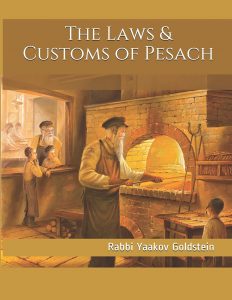

*The article below is an excerpt from the above Sefer
*As an Amazon Associate I earn from qualifying purchases.
Fasting:[1]
One does not fast in the month of Nissan, even a Taanis Yachid, and certainly not a Taanis Tzibur [with exception to a Taanis Tzibur Kavua, such as Taanis Bechoros[2]].[3]
A Chasan and Kallah: A Chasan and Kallah are accustomed to fast on the day of their wedding even if they are getting married during the month of Nissan. They are required to fast even on Rosh Chodesh Nissan, if their wedding is taking place that day [or that night after sunset[4]].[5] However, on Isru Chag, a Chasan and Kallah do not fast even if they are getting married that day [as will be explained below].[6]
Taanis Chalom:[7] One may fast a Taanis Chalom during the month of Nissan.[8] One is not required to make up the fast during the next month.[9] It is permitted to fast on a Sunday during Nissan to atone for a Taanis Chalom that was performed the previous Shabbos. This applies even if that Sunday is Rosh Chodesh Nissan.[10]
Taanis Yartzite:[11] A son/daughter does not fast on the day of the Yartzite of his father or mother throughout the month of Nissan.
Yom Kippur Katan:[12] One does not fast on the last day of Nissan, which is Erev Rosh Chodesh Iyar [known as Yom Kippur Katan, of which there are people that are accustomed to fast].
|
Summary:
One does not fast in the month of Nissan. This applies even to a Taanis Yachid, and certainly to a Taanis Tzibur. This applies even to the last day of Nissan which is Erev Rosh Chodesh Iyar [known as Yom Kippur Katan, of which there are people that are accustomed to normally fast on that day]. A Chasan and Kallah must fast on the day of their wedding even if it takes place in the month of Nissan. Even on Rosh Chodesh Nissan they are required to fast if their wedding is taking place that day, or that night after sunset. However, on Isru Chag, a Chasan and Kallah do not fast, even if their wedding will be taking place that day. |
All the above[14] is not prohibited according to the letter of the law, but is rather a mere custom that was introduced in the later generations. It is based on the teaching of our sages, that starting from the first of Nissan the Nesi’im began bringing sacrifices for the inauguration of the altar. Each Nasi brought a Karban on his designated day until [but not including] the 13th of Nissan. The day that each Nasi brought his sacrifice was considered as his Holiday [and thus, up until the 13th of Nissan it was considered like a Holiday].[15] On the 14th of Nissan, all of Israel would bring their Pesach sacrifice, and thus it was a holiday for all Israel. [For this reason, we are accustomed to omitting Tachanun on these days]. [Now, with regards to the remaining days] since afterwards comes 8 days of Pesach, which are a Holiday, therefore it ends up that majority of the month is holy, as only the 13th, [and past the 8th day of Pesach] are non-holidays. Thus, the custom is to treat the entire month with holiness similar to a holiday and omit Tachanun and avoid fasting.
_________________________________________________________________________[1] Admur 429:9; Michaber 429:2; Miseches Sofrim 21:3
[2] The fast if the Bechoros does not contradict the above being that it has a set date within the month of Nissan. The above only refers to avoiding establishing a private or public fast day for this month which does not repeat annually. See also Michaber 580:2 for three fast days of Tzaddikim mentioned in this month.
[3] The reason: See C!
[4] Meaning that even if they are getting married at night when it is already the second day of Nissan, nevertheless they are to fast on Rosh Chodesh as that is considered the day prior to their wedding.
[5] Admur 429:9; Rama 573:1
The reason: It is permitted for a Chasan to fast on Rosh Chodesh Nissan, being that some say one is to always fast on this date, as on Rosh Chodesh Nissan Nadav and Avihu passed away. [Rama ibid; Michaber 580:1-2; Admur 288:3]
[6] Admur 419:17
[7] Admur 429:10; 288:3
[8] The reason: As even on Shabbos and Yom Tov one is allowed to fast a Taanis Chalom. [ibid]
[9] The reason: Being that the prohibition of fasting on the weekdays of this month is only a custom, [and not the letter of the law, as will be explained] therefore, one who fasts due to a dream during the month, which is allowed even on Shabbos and Yom Tov, does not need to fast in Iyar to atone for the sin that he did by fasting in Nissan, as is needed to be done when one fasts on Shabbos. [Admur ibid]
[10] Admur 429:11, 288:3. Regarding Isru Chag-see below
[11] Admur 429:9; Rama 429:2; Admur 429:17 regarding Isru Chag
[12] Admur 429:9; M”A 429:5
[13] Admur 429:9; M”A 429:3; Peri Chadash 429:2; Olas Shabbos 429:2; Miseches Sofrim 21:3
[14] Meaning the omission of Tachanun and the ruling that one is not to fast.
[15] Customarily, the day that each person brought a sacrifice was considered a holiday for him.


Is one to be particular to eat or drink something prior to chatzos every day of Nissan, in order to avoid fasting?